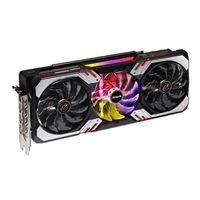Selecting the Best Graphics Card
Arguably the most crucial component of any PC is the graphics card (GPU). For gamers and design based professionals, the graphics card, or GPU, handles the majority of their computing workload. Other parts such as the motherboard, processor, RAM, or storage drives are also important; however, activities such as high FPS gaming, 3D Rendering, or advanced media editing require powerful graphics cards.
With more people working from home than ever before, the need for graphics cards is at an all time high. Whether your home is now your office or you are streaming the latest games to an audience, your GPU will become the workhorse of your computer.
Your Graphics Card Options
When it comes to purchasing a GPU, the first decision you need to make is between an NVIDIA graphics card, an AMD graphics card, or an Intel graphics card. Graphics cards that support Ray Tracing and DLSS (NVIDIA) or FSR (AMD) are becoming more popular as they provide gamers the highest quality graphics possible without sacrificing frame rates.
At Micro Center, we proudly offer all of the top rated graphics cards by these two brands. As you can see from our selection, you have plenty of options, but it helps to take a look at a few of the most popular models. If you are selecting a graphics card specifically for PC gaming, you will want to make sure you take a peek at all of the best selling GPUs by AMD, NVIDIA, and Intel at Micro Center.
NVIDIA, AMD, and Intel
The NVIDIA GeForce line is a standard among gamers who want to take advantage of Ray Tracing and DLSS. All of these graphics cards rank high when it comes to frames per second, power consumption, high boost clock, and overall performance. They also have amazing features to enhance PC gaming, such as G Sync which helps ensure a fast and smooth gaming experience.
AMD produces top of the line graphics cards for gamers and beyond. The AMD Radeon RX gaming graphics card series is a great choice for those building a high performance gaming setup. AMD’s FreeSync technology supports a variable refresh rate to help prevent tearing and reducing, ensuring a top tier gaming experience.
Intel graphics cards, while relatively new on the scene, are quickly becoming competitive options for many gamers and creators. Intel's Xe Media Engine was the industry first for AV1 Coding and Transcoding Technology, and the Xe Media Engine gives creators the power to cultivate compelling content powered by the first graphics card to support all current leading media formats. The Intel Arc series brings Intel's decades of experience in processor design to the world of graphics cards, with cutting edge graphics tech that takes advantage of both Resizable BAR (ReBAR) and SAM (Smart Access Memory) technology. The performance of the Intel Arc graphics cards is powered by the Xe HPG Microarchitecture, a new microarchitecture designed explicitly for graphics cards.
Whether you opt for a graphics card by AMD, NVIDIA, or Intel, you can further customize your experience by choosing the AIB brand of your housing. The units are produced by brands you know and trust, including ASUS, MSI, Gigabyte, PowerColor, EVGA, PNY, Sapphire Technology, and more, so you know you are getting a high quality product.
Graphics Card Compatibility
While graphics cards are less complicated to install than other components, you will still need to do some research to ensure your new GPU is compatible with your computer. Due to the demands of some modern graphics cards, they can sometimes require larger power supplies. Specific GPUs, such as some 30 series cards from NVIDIA, will even require proprietary cables to connect to a power supply.
You will also need to think about the motherboard, cooling system, connectors (DisplayPort, HDMI, etc.), and other components when you are building your computer with a pre selected GPU. If you are considering an Intel GPU, make sure that your CPU supports either ReBAR or Smart Access Memory. Remember that form factor matters as well and you need to choose a graphics card that will fit in your case nicely. Compact and low profile graphics cards are shorter and will take up less space in the PC case, so they are ideal for those with space constraints.
Luckily, the experienced team at Micro Center is there at any time to help you find what new graphics cards are compatible with your system. The technicians at the Micro Center Service Department can even install your new component for you, saving you time and eliminating potential issues.
External Graphics Cards
Laptops with a Thunderbolt 3 or Thunderbolt 4 port can even connect to what is called an external graphics card to increase image processing power when needed. External graphics cards function by connecting to a laptop through this Thunderbolt 3 or 4 port and many external GPUs have additional USB, USB C, and even network ports, so they can effectively function as a dock as well. The main benefit of external graphics cards is that they allow you to have a lightweight and portable laptop while you are travelling and still have the full power of a Desktop GPU when you are home.




